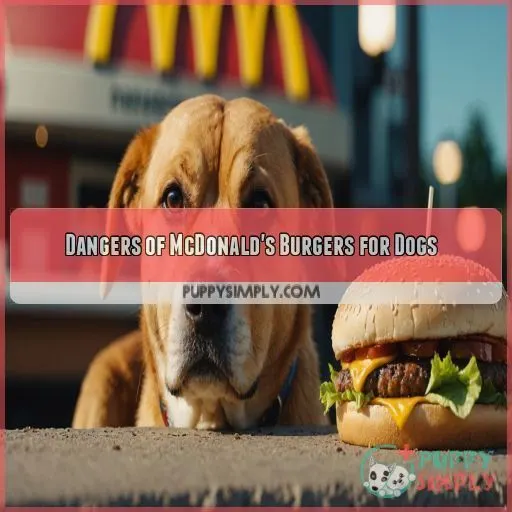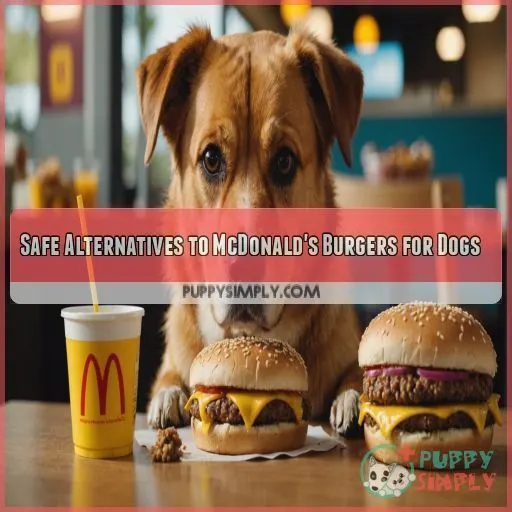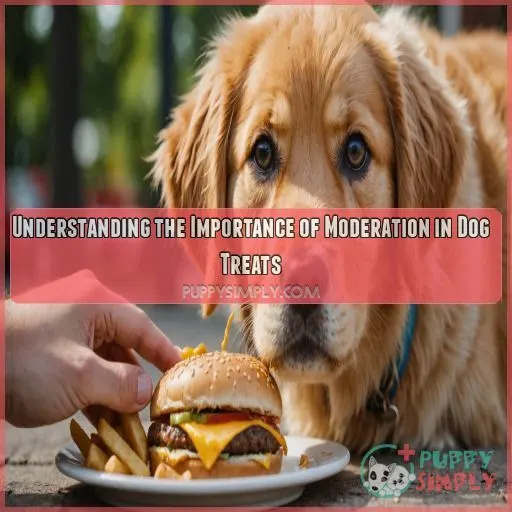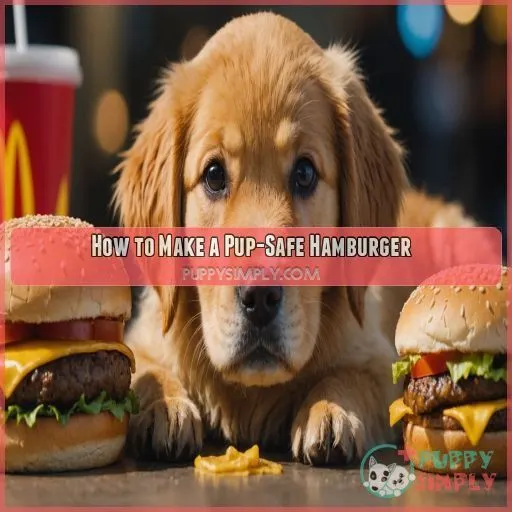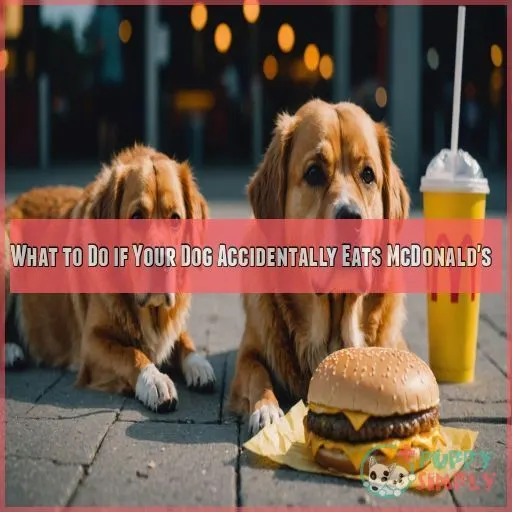This site is supported by our readers. We may earn a commission, at no cost to you, if you purchase through links.
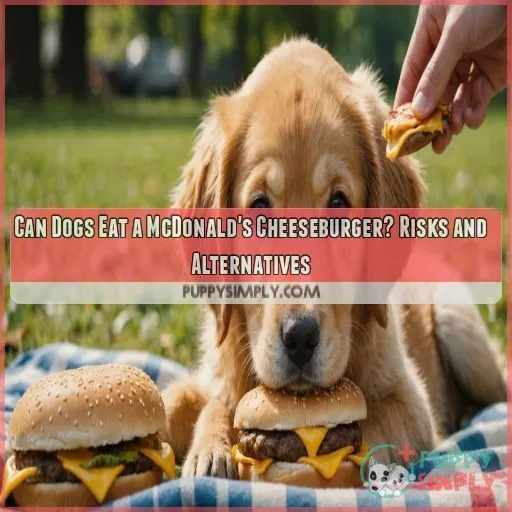
Those greasy patties and onion-packed buns can really upset their tummy.
Plus, the high fat and salt content is a no-go for our four-legged friends.
Instead, whip up some homemade, dog-friendly burgers with lean ground beef, veggies, and whole grain buns.
Your pup will gobble those up without the risky side effects.
And don’t forget to check out the dog-friendly menus at local restaurants – they’ve got tasty, safe options that’ll have your furry bestie wagging their tail.
Just remember, moderation is key regarding treats.
Table Of Contents
- Key Takeaways
- Dangers of McDonald’s Burgers for Dogs
- Safe Alternatives to McDonald’s Burgers for Dogs
- Understanding the Importance of Moderation in Dog Treats
- Addressing Dog Vomiting and Heavy Breathing
- How to Make a Pup-Safe Hamburger
- What to Do if Your Dog Accidentally Eats McDonald’s
- Frequently Asked Questions (FAQs)
- Can my dog eat a McDonald’s cheese burger?
- Can dogs eat burger cheese?
- Can I give my dog a McDonald’s nugget?
- What happens if my dog eats my burger?
- Can dogs eat McDonalds French fries?
- Are McDonalds condiments harmful to dogs?
- How much sodium is in McDonalds cheeseburgers?
- Is McDonalds fish filet safe for dogs?
- Can lactose-intolerant dogs eat cheeseburgers?
- Conclusion
Key Takeaways
- You’re barking up the wrong tree if you think sharing your McDonald’s with Fido is a good idea. Those greasy patties and onion-packed buns are like a tummy trouble time bomb for your pup.
- Don’t let those puppy dog eyes fool you – the high fat, salt, and potentially toxic ingredients in fast food burgers can make your furry friend sicker than a dog McDonald’s for dogs. Stick to dog-friendly treats instead.
- If your curious canine manages to snag a bite of your Big Mac, don’t panic. Keep a close eye on them for signs of an upset stomach or food poisoning, and call your vet if you’re worried.
- Want to treat your pooch to a burger without the side of guilt? Whip up a homemade version with lean meat, dog-safe veggies, and whole-grain buns. Your pup will be wagging their tail in delight – and you’ll be the top dog in their eyes.
Dangers of McDonald’s Burgers for Dogs
If you’ve ever thought about sharing a McDonald’s cheeseburger with your dog, you might want to think again.
Those juicy patties contain ingredients like onions and salt, which are about as welcome to a dog’s stomach as a cat at a dog show!
Toxic Ingredients in McDonald’s Burgers
Lurking within those tempting McDonald’s burgers are onions – a canine no-no that can lead to anemia.
It’s best to keep your pup’s paws off the Golden Arches.
Grease and sugar also spell trouble for your dog.
Risks of Onions, Grease, Sugar, and Salt
Think twice before sharing your McDonald’s cheeseburger with your furry friend.
Onion toxicity is no joke, and the grease can upset their tummies faster than a rollercoaster ride.
With sugar’s impact and salt concerns, finding safe alternatives is your best bet.
Impact of Buns and Condiments on Canine Health
The buns and condiments on a McDonald’s cheeseburger might spell trouble for dogs.
All those extras and sauces can upset your furry friend’s stomach, leading to digestive issues, so it’s best to stick to safe chicken preparation.
It’s a bit like inviting a tornado to a picnic—nothing good can come of it!
Signs of Food Poisoning in Dogs
While buns and condiments add unnecessary drama to your dog’s diet, watch for food poisoning signs.
If Max starts acting like a couch potato with symptoms like:
- Vomiting and diarrhea
- Lethargy and loss of appetite
- Abdominal pain and discomfort
It’s time to call the vet!
Safe Alternatives to McDonald’s Burgers for Dogs
McDonald’s burgers may be tempting, but they can pose serious health risks for your canine companion like butter’s high fat content.
There are plenty of safe and delicious alternatives that will keep your pup happy and healthy.
These include homemade dog-friendly burgers and engaging social activities.
Homemade Dog-Friendly Burgers
While McDonald’s cheeseburgers pose risks, homemade burger recipes can be both delicious and safe for your furry friend.
Use dog-friendly ingredients with nutritional benefits for a treat they’ll love.
Try these burger alternatives at home!
| Safe Ingredients | Benefits |
|---|---|
| Lean Ground Beef | High Protein |
| Carrots or Peas | Vitamins and Fiber |
| Whole Grain Bread Buns | Energy and Carbohydrates |
Dog-Specific Treats and Snacks
After whipping up some homemade dog treats, explore healthy snack options from reputable commercial treat brands.
Make sure treat ingredients suit your pup’s allergies and sensitivities.
Social Activities and Engagement for Dogs
Rather than risking troubles with McDonald’s, try taking Fido to dog parks or hiking trails for exercise.
Set up canine play dates or join training classes.
Keep boredom at bay with puzzle toys.
These activities give dogs healthy fun that burgers can’t provide!
Dog-Friendly Restaurants and Outdoor Seating
Many local restaurants offer dog-friendly menus and outdoor seating.
This provides a fun dining experience for you and your pup.
Just be mindful of restaurant etiquette and your dog’s needs.
While McDonald’s isn’t ideal, many local restaurants offer dog-friendly menus and outdoor seating, providing a fun dining experience for you and your pup. Just be mindful of restaurant etiquette and your dog’s needs.
Understanding the Importance of Moderation in Dog Treats
While your dog might give you the puppy eyes for a bite of your McDonald’s cheeseburger, it’s important to remember that moderation is key regarding dog treats.
Just like humans shouldn’t eat too much junk food, too many indulgent treats can lead to weight gain and health issues in our furry friends.
Treats in Moderation to Prevent Weight Gain
Don’t let your furry friend become a butterball! Juggling healthy dog snacks with balanced meals helps manage their weight.
Here are tips:
- Monitor portion control.
- Avoid high-calorie treats.
- Keep playtime active.
Individual Dog Needs and Health Conditions
When considering treats, remember every dog is unique.
Your pooch’s breed, age, and medical history, like dietary restrictions or allergies, play a role.
A tiny Chihuahua won’t need the same snack as a bouncy Labrador!
Balance is key, keeping pups healthy and tails wagging.
Consulting Your Veterinarian for Personalized Advice
Consult your vet for personalized advice on the right treats and portions for your pup.
They know your dog’s unique needs and can help you avoid any health issues from overindulging.
Monitoring Water Intake and Hydration Status
Keeping your pup happily hydrated is like guarding a treasure chest!
Use hydration tests, such as gum checks or skin tenting, to make sure they’re not parched.
Look for dehydration signs like sunken eyes.
Clever water bowl tricks can also quench your puppy’s thirst.
Addressing Dog Vomiting and Heavy Breathing
When your dog sneaks a McDonald’s cheeseburger, you might soon face an unhappy tummy and excessive panting.
Don’t let Fluffy’s adventurous palate lead to puke-fueled chaos.
Learn how to address these symptoms and keep your furry friend feeling fine.
Symptoms and Possible Causes of Vomiting
So, you’ve mastered moderation in dog treats, but what if Rover’s a bit green around the gills?
Causes of vomiting in dogs can range from eating too fast right up to tasting that forbidden cheeseburger.
Keep calm; know the vomiting triggers and their treatment.
Hydration Tests for Dehydration in Dogs
To check if your pup is dehydrated, try the skin tent test. Gently pinch the skin on their back and release. If it’s slow to snap back, they need fluids.
You can also check their gums. They should feel wet, not dry or sticky.
Keep an eye on their panting, too.
Treating Vomiting and Nausea in Dogs
When your dog’s tummy does somersaults, home remedies can lend a paw.
Skip food for 12-24 hours and try medication options like Pepcid AC to ease nausea.
Introduce small, low-fat portions after.
Watch out for dehydration risks and consider dietary changes for future prevention.
Seeking Veterinary Care for Emergency Situations
So you’ve done all you can to treat vomiting, but your furry pal’s still huffing like a steam engine? It might be time to go to the emergency vet.
You should go to the emergency vet if you notice any of the following signs:
- Heavy panting persists
- Severe dehydration
- Lethargy
- Continuous vomiting
How to Make a Pup-Safe Hamburger
If you want to treat your pup to a safe and delicious burger, skip the drive-thru and make one at home.
You can make a safe and delicious burger for your dog with simple ingredients like lean ground beef and whole grain bread.
This way, your dog will be drooling safely and happily without sneaking forbidden fries under the table.
Ingredients for a Dog-Friendly Hamburger
To make a pup-safe burger, start with a few key ingredients: lean ground beef, some safe veggies like sweet potato or carrot, and a whole grain bun.
Avoid spices, onions, and other risky toppings.
Portion control is key – just a small patty for your furry friend.
Instructions for Preparing a Safe Hamburger
To prepare a safe hamburger for your pup, stick to dog-friendly ingredients.
Start with lean ground beef.
Cook thoroughly without spices.
Use a simple recipe like:
- Mix in some cooked veggies.
- Form patties.
- Control portions; think snack-sized, not "doggy buffet."
Bon appétit, pupper!
Avoiding Condiments and Toppings
So, now you’ve got the burger ready, but let’s talk condiments.
Avoid mustard and ketchup, as they aren’t dog-friendly.
Stick to safe toppings like plain veggies.
Keep it simple and your pup will thank you with wagging tails.
Portion Control for Dogs
Finding the right treat size is like trying to fit into old jeans!
For your dog’s safety and waistline control, tailor portions based on their breed size, age, and health issues.
What to Do if Your Dog Accidentally Eats McDonald’s
If your dog accidentally gets their paws on a McDonald’s cheeseburger, don’t panic.
Closely monitor your pup’s behavior and health.
Take steps to prevent future food-related incidents that could make them sick.
Identifying the Type and Amount of Food Consumed
Uh-oh! Did your curious pup just devour a McDonald’s cheeseburger?
First, check for any leftover scraps or food wrappers lying around.
Knowing the portion size they’ve gobbled is really important.
It’s like solving a mystery – food identification helps gauge risk.
Monitoring Your Dog’s Behavior and Health
You’ve eyed your pooch munching on McDonald’s, huh? Time to channel your inner detective!
Watch for dog health concerns like vomiting or lethargy. Those are your early detection cues.
Notice dog behavior changes and embrace holistic care approaches.
Regular checks offer peace of mind.
And pet insurance? It’s your secret weapon for unexpected hiccups on this canine adventure.
Preventing Future Accidents and Food Poisoning
Preventing a chowhound from making a fast-food feast is simple with a dog-proof kitchen.
Make sure leftovers are in sturdy containers with food storage tips.
Teaching kids safety around pets is important.
A sprinkle of pet-first aid knowledge preps you for mishaps.
Frequently Asked Questions (FAQs)
Can my dog eat a McDonald’s cheese burger?
Feeding your dog a McDonald’s cheeseburger is like opening Pandora’s box of tummy troubles.
The onions, salt, grease, and buns can harm your furry friend.
Stick with homemade treats or pet-friendly snacks for wagging tails.
Can dogs eat burger cheese?
Your pup might love cheese, but processed burger cheese can be too salty and greasy for their tummy.
It’s like inviting trouble to dinner—best to skip it and opt for plain, dog-friendly cheese in moderation.
Can I give my dog a McDonald’s nugget?
Sure, you could give your dog a McDonald’s nugget, but it’s like giving them a greasy little surprise.
High salt and fat content might upset their tummy.
What happens if my dog eats my burger?
Imagine if your dog gobbles your burger—it’s risky!
Around 30% of a McDonald’s burger is fat, which might upset your dog’s tummy like a roller coaster ride.
Watch for vomiting and provide water.
Consult your vet if symptoms persist.
Can dogs eat McDonalds French fries?
Think twice before sharing McDonald’s fries with Fido!
They’re loaded with salt and unhealthy fats, which aren’t good for pups.
Imagine your dog facing a grease-packed obstacle course—it’s best to keep fries off their menu!
Are McDonalds condiments harmful to dogs?
Imagine condiments as a ticking time bomb.
McDonald’s ketchup and mustard contain salt and sugar, which are harmful to dogs in large quantities.
While a lick won’t harm Fido, it’s safer to stick to dog-friendly treats.
How much sodium is in McDonalds cheeseburgers?
A McDonald’s cheeseburger contains about 720 milligrams of sodium.
That’s a lot of salt!
Too much salt can lead to serious health issues for dogs.
Keep your furry friend safe by limiting their salt intake.
Is McDonalds fish filet safe for dogs?
Imagine a fish out of water—unsettling, right?
That’s similar to feeding your dog a McDonald’s fish fillet; it’s not ideal.
High salt, unhealthy additives, and potential allergens make it an unwise choice for your furry friend.
Can lactose-intolerant dogs eat cheeseburgers?
Cheeseburgers are a no-go for lactose-intolerant pups.
The cheese and bun can really upset their tummies.
Stick to dog-friendly treats to keep your furry friend feeling their best.
Conclusion
Whoa, you’d have to be barking mad to even consider feeding your furry friend a McDonald’s cheeseburger!
While it might seem like a tasty treat, it’s a potential health disaster waiting to happen.
Instead, treat your pup to homemade, dog-friendly burgers or vet-approved snacks.
Your four-legged companion will thank you with wagging tails and happy barks.

